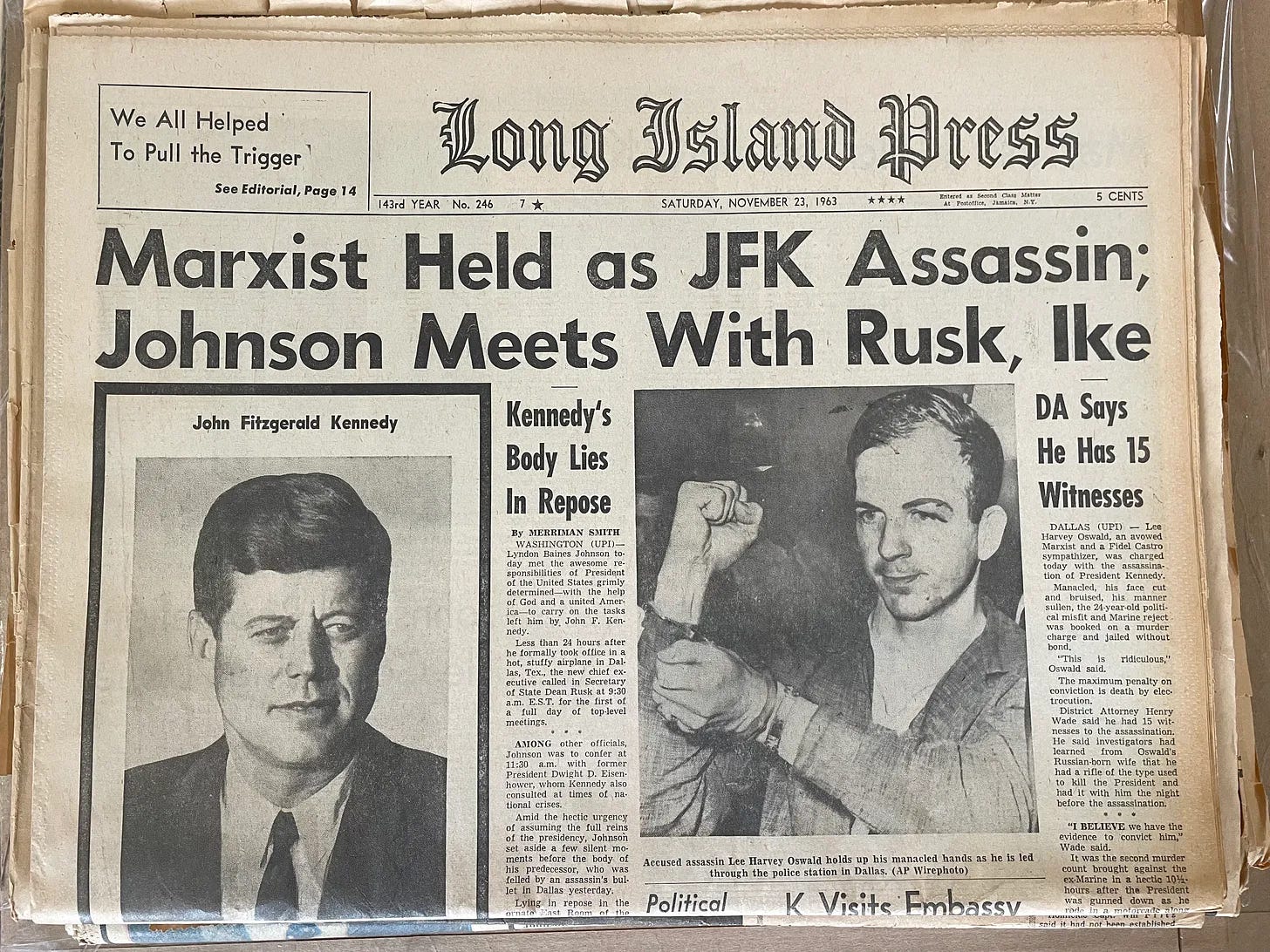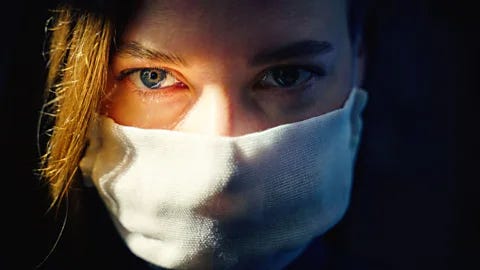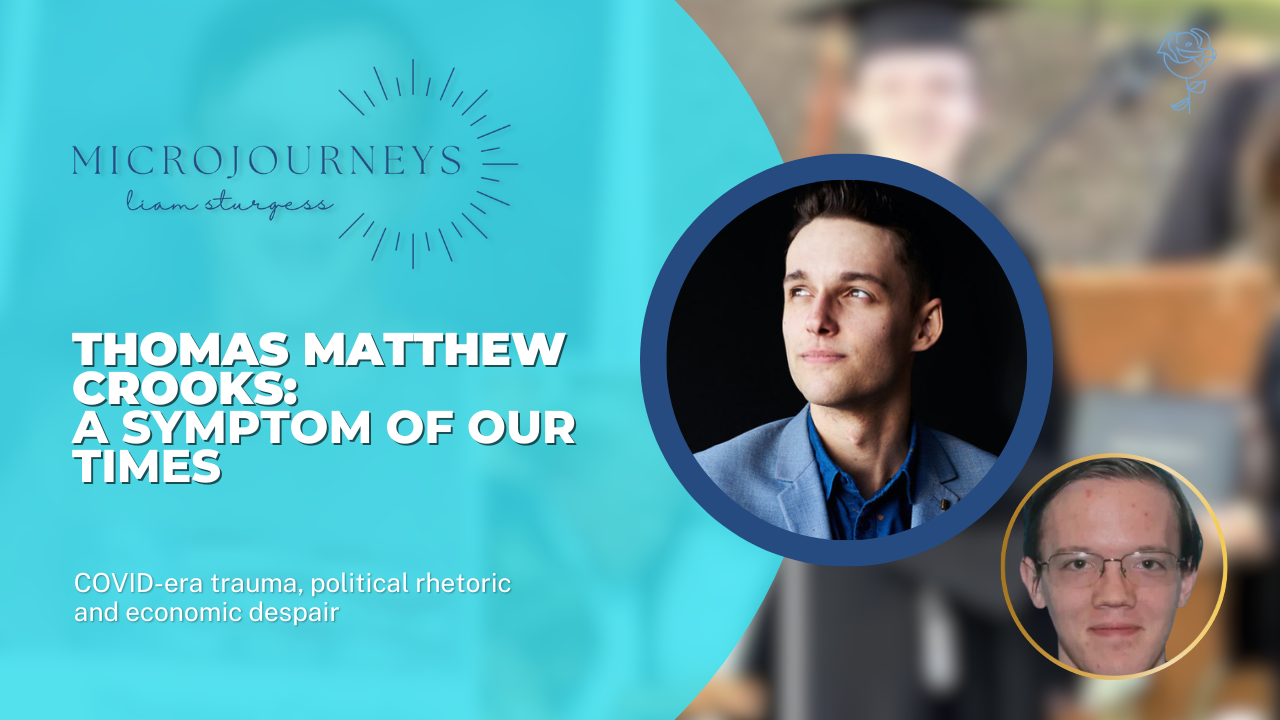Originally published by Microjourneys
As the United States and the world reel from the attempted assassination of former President Donald Trump a week and a half ago, we continue to ask: Who is Thomas Matthew Crooks? What led him to decide to take a life and risk many more? Was he the only shooter, or was there a larger plot at work?

No matter where the facts land, Crooks is but a symptom of a larger problem we have not yet fully faced: a deeply entrenched depression within ourselves and society at large.
According to a May 2023 Gallup poll, the number of adults diagnosed with depression at some point in their lives reached a record 29%. Meanwhile, 42.3% of high school students reported feeling sad or hopeless for periods of up to a week at a time in 2021, according to the Centers for Disease Control and Prevention. Then there’s the election itself, which, as highlighted by USA Today, is exacerbating anxiety and stress among young adults, who are tired of “the ‘vitriolic’ language of the campaigns and the stakes for issues like the economy, reproductive rights and immigration.”

Despite this mental health epidemic, both major party candidates have failed to address the crisis beyond throwing more money at a broken healthcare system. This, along with his personal experience battling addiction, led to Robert F. Kennedy Jr.’s plan to “build free healing centers in depressed communities across the nation” for those struggling with depression, as covered in Newsweek.
Hallmarks of a presidential assassin
The day after the July 13 shooting, the Federal Bureau of Investigation named 20-year-old Pennsylvania resident Thomas Matthew Crooks as the suspected shooter. And, like the presidential assassins of history that Crooks apparently sought to emulate, authorities have stated that he “appears to have acted alone,” as reported by the Washington Post.

Of course, history has revealed that such early proclamations by law enforcement weren’t always as well-founded as initially insisted.
Further reading: The New York Times’ Kennedy Problem, and Other Inconvenient Truths
But per reporting by CNN and ABC News, there appears to be little doubt that Crooks, acting alone or not, participated in this shocking act. What isn’t clear, however, is the why.
When the FBI, with the help of Israeli intelligence firm, Cellebrite, initially broke into Crooks’s phone (as reported by the Times of Israel), they reportedly didn’t find any direct evidence of a plot to assassinate the former president, either alone or with others. However, on July 17, the New York Times reported that members of Congress had been briefed on a series of internet searches Crooks allegedly made that seem to shed light on his mental state leading up to the shooting. One search query in particular stands out: “major depressive disorder.”
This search is not proof of anything on its own; Crooks worked at the Bethel Park Skilled Nursing and Rehabilitation Center, and his parents are both licensed social workers, according to records published by Newsweek. Others are more vocal in their assessment that Crooks was mentally ill. Newsweek cites George Washington University’s Matt Dalek who identifies similarities between Crooks and other presidential assassins, while the Boston Herald’s editorial staff drew comparisons to numerous infamous school shootings. Frances Scott has previously explored the controversial question of the role of antidepressant medications in school shootings, particularly SSRIs, in The Kennedy Beacon.
COVID-era aftershocks
But other subtle details have emerged that are consistent with the notion that Crooks was under psychological duress leading up to the attack. According to Jason Kohler, a high school classmate quoted by Voice of America, Crooks continued to wear a surgical face mask “after COVID mask mandates ended.” There is a widely-observed but under-discussed psychological impact of mask-wearing, as highlighted in a January 2021 report by the BBC. People suffering from social anxiety experience a reprieve behind the safety of a barrier, rendering mask-wearing an effective yet harmful coping mechanism. This therapeutic experience of hiding behind a mask is explored further in a September 2020 story titled COVID-19: My Psychological Safety Mask, and many other such stories can be heard online and from our own friends and family.

In fact, many of us can relate to Crooks more directly than we know. He was in the middle of high school when the State of Pennsylvania ordered its first COVID-19 lockdown in March 2020, closing schools and “non-essential” businesses. In his most formative years, Crooks was put in functional house arrest, told that he and everyone he knew was at risk of dying, and promised that his old life was over in exchange for an ambiguous “New Normal.”
Of course, both the Democratic and Republican Parties had their hand in kneecapping the development, learning, and future prospects for America’s youth, and Crooks may well have understood this. His thin political history reveals that he gave a $15 donation to the Progressive Turnout Project (a Democratic Party-aligned PAC) on the day President Joe Biden was inaugurated in January 2021, yet he was registered as a Republican at the time of his attack on Trump and his supporters.

We can’t know for sure what led Crooks to participate in such a country-shattering act as attempting to assassinate the former president and major candidate. But as highlighted by RFK Jr., the first step towards resolving this crisis is to unite in prayer for the victims of the attack, including President Trump and Corey Comperatore, who, his family reports, died blocking his wife and daughter from the oncoming bullets. To prevent the next, we need to “step back from the division” and “renounce all violence” in the name of political differences.
Crooks is solely responsible for his own actions. The larger gap between everyday Americans, however, is up to each individual to bridge.
Note: this article was originally written for publication by The Kennedy Beacon, paid for by American Values 2024. However, it was set aside as the story of Thomas Matthew Crooks quickly evolved and the Beacon correctly refocused on other important issues. With permission from my editor, I’ve decided to publish the article independently as a Microjourney.
Please subscribe to The Kennedy Beacon for more excellent coverage of the 2024 United States presidential election and Robert F. Kennedy, Jr.’s independent campaign!

